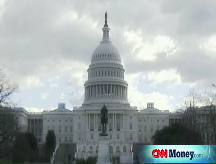'Buy American' - Sparks fly
A stimulus provision that bans the purchase of foreign construction materials for public works projects gets jeers from economists and European trade interests.
NEW YORK (CNNMoney.com) -- A debate is brewing at home and abroad over an economic stimulus measure that would require materials used in the program's infrastructure projects to be purchased from American companies.
In the $819 billion House bill passed Wednesday, the so-called "Buy American" provision would, with some notable exceptions, ensure that only U.S.-produced iron and steel be used for construction. It expands on a 76-year-old federal law. The Senate, which is likely to take up stimulus next week, would go even further, effectively requiring that any products and equipment be American-made.
"The Buy American provision will help stimulate our own economy," Sen. Byron Dorgan, D-N.D., who wrote the provision, told CNNMoney. "When taxpayer dollars are used, we should urge that money to support the things produced here at home."
The plan is already drawing opposition. The European Commission on Thursday said it might challenge such a move if it were signed into law. The proposal also appears to fly in the face of a G-20 agreement reached in November, when world leaders decided not to raise new trade barriers in 2009.
Furthermore, many economists argue that a Buy American provision could actually backfire, slowing economic growth instead of helping expand the American job market.
"It's not a good time to initiate protectionist measures in any shape or form," said Kurt Karl, head of economic research at Swiss Re. "It hurts growth, because if you force one side to go with domestic production only, then that precludes them from getting less expensive materials from overseas."
The economy is already reeling, and will soon enter the 15th month of a recession. Economists expect a Commerce Department report to show the U.S. economy shrank by 5.4% in the fourth quarter, the biggest decline in 26 years. But some think holding back trade could exacerbate the problem.
A major drop in trade could cause a 1% drop in gross domestic product, according to Karl.
"We believe it invites reciprocal restrictions on U.S. exports," said Peter O'Toole, a spokesman for General Electric (GE, Fortune 500), which gets half its of revenue from abroad. "When you take competition out, it drives prices up. We're in a globalized world - we can't turn back the clock."
Previous efforts have misfired. For instance, from 2001 to 2003, the Bush administration imposed several so-called "safeguard" tariffs on certain steel products from various foreign countries in an attempt to prevent U.S. steel mills from closing.
Foreign steel makers found other markets during that span, namely China and Middle Eastern countries. When U.S. demand for steel heated up again in 2004, steel prices skyrocketed by 48% in a year, according to the Labor Department.
Also, Buy American would set a bad precedent, say many experts, arguing that protectionist ideology of the pre-Great Depression era exacerbated the economic calamity of the 1930s.
"In the Depression, we had anti-trade policies that aggravated the global recession," said Karl. "It's not a good idea from an economic or stability view, but politically, many congressmen still see it as appealing."
A host of politicians believe the Buy American provisions have appropriate safeguards to ensure stimulus spending is not wasted on expensive materials and the U.S. economy does not suffer long-term consequences.
For instance, the bills both stipulate that if construction costs would rise by 25% or more due to the purchase of American-made materials, contractors could receive a waiver to purchase foreign materials. The bills also allow for a waiver if buying American is not in the best interest of the economy or taxpayers.
"There is a broad public interest waiver, that ensures that if something is impractical or impossible, the administration can waive it easily," said Dorgan. "But to the extent we can, if we're going to use steel and other construction products, we want to buy ones that are manufactured here."
Rep. Peter Visclosky, D-Ind., who introduced the House's Buy American amendment that won unanimous support, did not believe that the mistakes of the Great Depression applied to this case.
"It's not protectionist - there are no tariffs or barriers being created," said a Visclosky spokesman. "It's about the U.S. steel industry running at or below 45% capacity, and the objective is creating jobs."
Dorgan also rejected the notion that the stipulation might cause an international showdown, arguing that the World Trade Organization does not regulate federal grant programs like those included in the stimulus bill, should it pass.
In the end, Dorgan said his support for the bill comes down to fulfilling President Obama's promise of creating up to 4 million American jobs.
"We face an emergency situation here - the country needs to put people back to work," Dorgan added. "If I'm going to be told that buying American goods hurts the economy, then I'm sorry, we have a disagreement on that." ![]()


